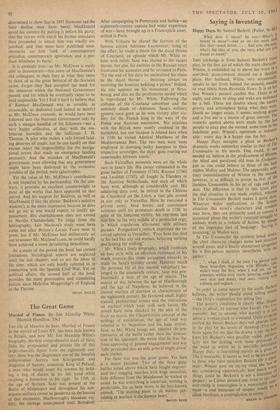Saying is Inventing
Happy Days. By Samuel Beckett. (Faber, 9s. 6d.) What does it mean? he says—What's it meant to mean?—and so on—lot more stuff like that—usual drivel.. . . And you, she says' what's the idea of you, she says, what are You meant to mean?
Tins exchange is from Samuel Beckett's latest play, in the first act of which the main character, Winnie, is embedded up to above her waist in a scorched, grass-covered mound on a desolate plain. Her husband, Willie, very occasionally speaks to her from behind the mound, usually to read titbits from Reynolds News. It is so hot that Winnie's parasol catches fire. There is n° night, and times to sleep and wake are indicated by a bell. There are doubts about the earths gravity and atmosphere being what they were. Death no longer exists, it seems, nothing grows and a live ant is a source of great interest. The remarks quoted above were made by the last people to stray past the mound, some time in the indefinite past. Winnie's optimism is indonlit- able: every day is a happy one for her. Happy Days occupies a place in Beckett's dramatic works somewhat similar to that of The Unnamable in his novels. One could, if one needed to, believe in the predicament of Hamill, the blind and paralysed old man in Endgame,
just as one could believe in those of the
ridden Molloy and Malone. The apparently arbi- trary immobilisation of Winnie in the mound, however, is as difficult to accept as that of the limbless Unnamable in his jar of rags and saw- dust. The difference is that in this latest PloY the real situation is not made explicit, whereas in The Unnamable Beckett makes it quite clear. Whatever wider applications to the human situation this novel's characters and sythh°15 may have, they are primarily used to conveY 3 statement about the writer's constant struggle le embody truth in a vehicle of fiction, by meatns of the imprecise tool of language: 'Saying '' inventing,' as Molloy says. In The Unnamable the symbols break Own' the chief character changes name and situation several times, and is finally abandoned altogether for a first-person narrator identifiable with the author : . . when I think of the time I've Wasted With these bran-dips, beginning with 11,1tirp1V, 1812 wasn't even the first, when I had me. no th premises. within easy reach, tottering under 114 own skin and bones, real ones, rotting with solitude and neglect. . . In order to come nearer to the truth. Beckett believes, the writer should avoid telling stories
—the child's euphemism for telling lies.
The writer's condition is clearly what IlnIV Days is about, to anyone- who know./5 The tf.si namable; but to anyone who doesn't it is just about a woman stuck in a mound. Quite prope'k's (within his form), Beckett does not prOvide in the play for his levels of meaning..This c°•.• firms again for me that the drama is not the rest form for Beckett's own peculiar vision, partici', larly not for dealing with those processes ',It,
the mind in which he is specially interesleou
Happy Days is interesting mainly as a gloss err The Unnamable. It seems as well to be an ansW to those who have mistaken Beckett for a pessi- mist: Winnie goes on saying what she has ,, say, considering optimistically how much w°1-,sf things could be. Beckett's is not a literature °f despair: as Camus pointed out, even to sayt,. everything is meaningless is a meaningful sta qc... a ment—a real literature of despair would silent literature, a contradiction in terms.
',NON ',NON


































 Previous page
Previous page